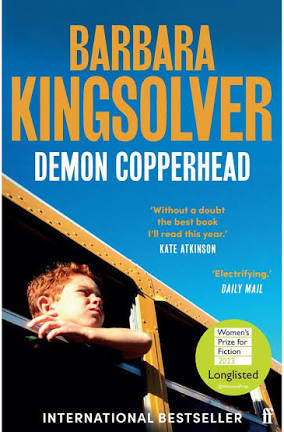While this retelling of Dickens’ David Copperfield has a strong thread running through it of the devastating effects of OxyContin on communities, it offers so much more than that. I recently reviewed Empire of Pain by Patrick Radden Keefe, the story of how the opioid crisis in the United States unfolded with Purdue Pharma’s promise of a world without pain.[i] That book focuses primarily on the Sackler family though it does touch on the lives of some of the thousands of Americans contributing to the family’s billions. Kingsolver situates her book in a rural community that has suffered many years of deprivation and where drug dependence is just one of the factors impinging on inhabitants’ lives. As a health professional educator, I see the value of this type of fiction as showing how social determinants of health play out in people’s lives and, perhaps for some readers, generates empathy for those whom parts of society have written off.
Demon Copperhead is a first-person narrative of loss, poverty, addiction and, yes, personal resilience. It is no surprise it is Dickensian in scope, with its cast of characters familiar from the source novel (Peggotty becomes Peggot, Micawber McCabe and there is an upside house I remember well from a BBC TV serial from decades ago). But this is rural Tennessee in the late 20th and early 21st centuries, a community that looks after its own where no-one locks their doors and goods are shared, but that is also laced with domestic violence, teenage pregnancies, lack of health care and illicit drug use. Too many girls graduate from high school into marriage and their children repeat the cycle.
The misery sometimes feels overwhelming but then Demon, and the reader, bounce back before another misfortune strikes. Illicit drugs become prescription medicines. Pain clinics have queues of patients waiting to see the doctor, who hands out subsidised scripts for a consultation fee, which is paid for by selling some of the OxyContin outside the surgery to another queue of desperate people.
The writing is so good. The characters believable. I feel shame at my profession for those who became a part of the opioid money-making dream and took advantage of the already disadvantaged.
Many of us health professionals have struggled with providing care to people with drug dependency issues. This book is a good example of how fiction can help us understand people’s experiences in a more compassionate way. How often have I really explored a patient’s story? We cannot and should not rely on a person’s resilience but advocate for change to the system to enhance equity and social justice. We need time, though, and a system that supports those who are struggling. In Tennessee, as in other jurisdictions, teachers and social workers, have high workloads for relatively low remuneration. Many children have no futures – there are just too many of them that need attention. Many foster families exploit their charges while receiving monthly payments to provide care.
A book that makes you think; an insight into a deprived community that has parallels with many where we work; there is some redemption, because it is a novel and I, as a reader, certainly needed to feel some hope.
Demon Copperhead by Barbara Kingsolver. Faber. 2022.
[i] https://healthprofessionspracticeandeducation.blog/2023/02/07/opioids-pain-and-the-power-of-marketing/
